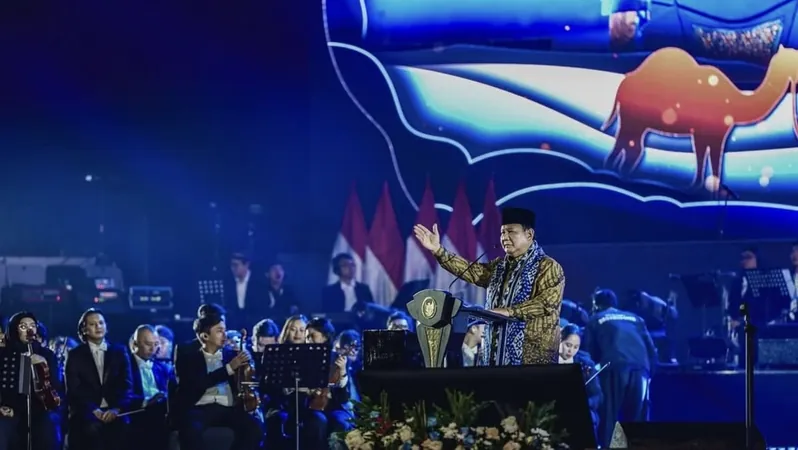
Prabowo Subianto Takes a Hardline Stance Against Corruption: Is Pardon Off the Table?
2024-12-31
Author: John Tan
Introduction
Indonesian President Prabowo Subianto has made headlines yet again, as he staunchly reinforced his position against those found guilty of corruption, just days after some wavering comments suggested a possible change in policy regarding pardons for graft convicts.
Stricter Sentences for Corruption Offenders
At a recent government meeting, Prabowo did not mince words in his appeal to judges, advocating for stricter sentences for corruption offenders. He emphasized that individuals causing significant financial losses to the state should face lengthy prison terms, particularly when their actions lead to losses amounting to hundreds of trillions of rupiah.
“Judges, please impose sentences that reflect the severity of these crimes. If the public feels that sentences are too lenient, they'll question my understanding of justice,” Prabowo stressed, as reported by the Jakarta Globe.
Public Outcry Over Lenient Sentences
His remarks came on the heels of public outcry following the conviction of businessman Harvey Moeis, who received a mere 6.5-year sentence despite his involvement in a massive corruption scandal that reportedly caused estimated damages of $18.6 billion, primarily due to environmental devastation from illegal mining activities.
“People will perceive this as injustice—how can one steal hundreds of trillions and serve merely a handful of years?” Prabowo noted, hinting at widespread dissatisfaction with the light sentences for high-profile graft cases.
Pardons and Rehabilitation
Just days prior, Prabowo had faced backlash after suggesting the possibility of pardoning graft convicts under certain conditions, specifically mentioning that offenders could be pardoned if they return the stolen funds.
However, he was quick to clarify at a Christmas event in Jakarta that his intention was focused on rehabilitation and accountability, urging the wrongdoers to 'repent' rather than expect leniency.
Controversial New Approaches
During his visit to Egypt just a few weeks ago, he hinted at the idea of using the retrieval of stolen assets as a pathway to reduce prison overcrowding. This “new approach” drew skepticism from various legal experts and politicians, who warned that it could weaken Indonesia’s already precarious battle against corruption.
Most notably, former minister Mahfud MD criticized the notion, stating that such measures could unravel the essential legal framework established to deter corruption in the country.
Criticism of Proposed Systems
In a dramatic twist, Law Minister Supratman Andi Agtas recently faced criticism for suggesting a 'peace fine' system as a part of Prabowo's asset recovery plans. This suggestion was met with backlash as critics viewed it as undermining the severity of corruption penalties.
Following the uproar, the minister publicly apologized, claiming he did not intend to suggest that this system would apply to corruption cases, and clarified that it was aimed at financial crimes like custom violations.
Amnesty Plans
Moreover, Prabowo's government is looking into a broader amnesty plan for 44,000 prisoners, yet officials reassured that this would not extend to corruption convicts, keeping the fight against graft non-negotiable.
Conclusion
As the country grapples with pervasive corruption, the future of Prabowo's anti-corruption policy remains uncertain. Will his hardline approach yield the transparency and accountability that Indonesians crave? Only time will reveal the true intentions behind his statement, as public scrutiny only continues to intensify.




 Brasil (PT)
Brasil (PT)
 Canada (EN)
Canada (EN)
 Chile (ES)
Chile (ES)
 Česko (CS)
Česko (CS)
 대한민국 (KO)
대한민국 (KO)
 España (ES)
España (ES)
 France (FR)
France (FR)
 Hong Kong (EN)
Hong Kong (EN)
 Italia (IT)
Italia (IT)
 日本 (JA)
日本 (JA)
 Magyarország (HU)
Magyarország (HU)
 Norge (NO)
Norge (NO)
 Polska (PL)
Polska (PL)
 Schweiz (DE)
Schweiz (DE)
 Singapore (EN)
Singapore (EN)
 Sverige (SV)
Sverige (SV)
 Suomi (FI)
Suomi (FI)
 Türkiye (TR)
Türkiye (TR)
 الإمارات العربية المتحدة (AR)
الإمارات العربية المتحدة (AR)